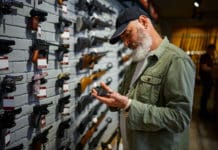TTAG Commentator Aaron Woodin writes: “There are a lot of tactical training schools and instructors out there. How do you know before, during and even after the class if these people are worth the time and money? It occurred to me that anyone not having served in Law Enforcement or Military (and perhaps some that have) might not have a good reference point, that someone fairly new to firearms might be taken in by a slick website, feel good about their instruction because the guy has an authoritative air, and then go home confident in their new skills, perhaps overly so. Gunsite Academy and Thunder Ranch have an excellent reputation, but who’s to say we shouldn’t question what we get from them, let alone all of the hundreds of smaller operators out there? Tell me what you think.”




This is a great question! Same thing I asked myself when I wanted to start training, so I done a lot of research to find the beat I could for me. After considerable time, questions and reading others comments about many different training groups I started with Suarez International and have never looked back or doubted the training an techniques! Why? At SI you not only get to learn and train with some of the best proven methods of proactive and reactive fighting, you also get to find out if it will work!
With Gabe’s professional, tried and tested methods, you are able to find out how, why, when, etc, aspects of reality based gunfights, AND are able to try them out in Force on Force situational circumstances. If the technique won’t work in FOF, it most likely won’t work in real life! Check out the forum at http://www.warriortalk.com and find out what others have to say.
Scott Vaughn
1. ^ Never believe commenters whose “independent reviews” use text lifted verbatim from a school’s website. ^
2. Ask around. THR, Ar15.com, here, etc.
3. Start local. You probably won’t learn as much or as fast at an NRA Personal Protection class as you will at the SiG Academy, but you also won’t be shelling out $2k+ for the privilege.
4. Figure out if a class is what you need, and then what you need from the class. You may not need a big trip to major school to correct a bad grip or a trigger jerk, but maybe an hour’s 1-1 instruction with your range’s chief instructor might do the trick.
5. No amount of high-level training will make up for a lack of practice.
Number 1: LOL! Other points are good too.
If you ask a question and the answer is “Thats just how its done” you might not be getting the best bang for your buck.
Scott,
That’s a good point… if the instructor includes Airsoft and/or Simunition force on force, then it should be easy to see how well the techniques are working.
I hear Gabe works his students pretty hard – which any instructor should.
Part of what motivated my question was that the prominent gun writers/commentators, who I generally respect quite a bit, seem to constantly talk up the “majors” like Thunder Ranch, Gunsite, Tiger McKee and a few others, to the exlusion of the independents.
While it’s likely a “safe bet” to go to one of the top-tier instructors, I’ve always suspected that there are lots of lower-profile “small fry” who have the potential to deliver teaching of a similar quality.
I felt that I learned a lot from a fellow in McKean, PA, and a lot from another in northern Vermont.
One criteria I think is probably key is whether former students return. The guy in PA didn’t seem to have repeats, but then again I took what was basically a PA CCW class which generally isn’t the sort of thing one repeats, unless they’re up for renewal.
The Vermont fellow had a batch of returning students of varied backgrounds, including Law Enforcement and military. I took this as a good sign.
I went with a local outfit due to practical considerations such as cost, schedule, and mostly because I did not need to travel to get there. Overall I was quite happy with the experience. Each class had a big emphasis on fundamentals and safe gun handling both as a reinforcement for the more experienced and to get noobs (e.g. me) started out right. I definitely encourage anyone in the Charlotte, NC area to check them out. http://www.hardtargettraining.com/
You brought up a good point: safety. Chances are if there isn’t a thorough safety briefing at the beginning of the course, and another safety review at the beginning of each session (if multi day) the instructor(s) most likely don’t care enough about the material in general.
Another good sign (I think) is when they’re willing to go “off script” and answer thoughtful questions from the students.
A really good guideline would be to check out the Vickers Shooting Method instructors. He even publishes a list on his website of local guys that are part of the “franchise” system.
Larry Vickers Endorsed Instructors
I believe the questions was: “How do you know before, during and even after the class if these people are worth the time and money”? Word of mouth (and even comments on forums although not so much) is one way. If the instructor has a book or DVD out (my prefered method) is an excellent way to get an overview of the material. During the class? If you get answers to your questions and not “that’s the way we’ve always done it”. After the class? Can you take the skills presented in class and continue to practice them? This can’t always be the case since alot of people only have access to a range where things like movement and multiple targets are limited if available at all.
I tend to find training is a lot like playing music. One 1st has to learn the notes to play, then one learns how to play sheet music, then finally one masters the skills enough to know which ‘rules’ can be broken or tweaked to the best result that works for the individual. Much like playing Jazz, rules can get bent or broken and the masters know when and where to do so with the maximum effect.
When I first started taking classes, I did so locally. Then after I had fundamentals down I began looking for more formalized training to augment the IDPA I was participating in. My 1st stop included a membership at Front Sight back when they started in Bakersfield (and back when memberships were rather pricey). Now of course one can obtain a membership rather cheaply and IMO its worth every damn penny. This was followed by augmenting my training at ITTS, Thunder Ranch and recently 1 course at Gun Site.
Bar none, the best bang for your buck can be found at Front Sight (No, I’m not affiliated in any way). Their beginner ‘weeder’ classes are somewhat boring but once one has the skill levels high enough to graduate, the higher level courses are fantastic. I’ve found them to be on par or better then what I’ve experienced elsewhere. Sure, their marketing sucks and if one is too lazy to halt phone calls, emails, and/or mail they can be an annoyance. But with regards to training itself, I visit as often as time allows.
What I’ve found over the years is that different schools will mimic each other in certain techniques and vary in others. Call them differing styles of music, or differing takes on technique. I see no problem with this as you’re looking for skills that make you a better shooter and not everything uniformly works for everyone. I’ve also found that there is little correlation with cost vs value obtained. Spending $2000 for a course may give one the perception that they are getting the best value for the money spent, but I have definitely left certain schools without being wowed enough to do a repeat. I’m not suggesting the other schools don’t offer excellent training; just not enough to equal the cost of each visit (at least for me).
Some of the schools I’ve mentioned have nice locations, great scenery and differing amenities available. Gun Site and Thunder ranch have fantastic scenery, and like Front Sight have professional and friendly staff. ITTS is simply an awesome experience. If your time available comes into play this also will be a factor with deciding which school to visit.
I guess my basic advice would be to train locally first tuning up your fundamentals. Do some 3 gun, IDPA, or IPSC, etc. And then go get some formalized training at one of the formalized schools. Just keep an open mind and consider that each school may have varying techniques and attitudes to solve problems. Use a filter and find what works best for you. 🙂
Do your homework.
Check credentials.
Avoid blowhards.
My criteria:
1) Demonstrated mastery of the skill to be taught. That means documented achievement meeting a standard. Could be from competition or testing through law enforcement, military or NRA program. Several well known instructors who excel at online self-promotion and “cult of personality” marketing fail this basic test.
Getting an attendance certificate from a school is not the same as graduation from a program with testing.
2) Subject matter expertise – acquired through real world experience, study with others, testing and evaluation. Includes continuing education. Ask your potential instructor about what they’ve done recently to develop their own skills – matches, classes, seminars, videos. Beware those with closed minds, self-named gimmick techniques, promises of magic results, and those proudly ignorant of or openly rebellious against the past 100 years of handgun training.
3) Evaluate student accomplishments. Have students used skills learned to survive real incidents? Win matches? Other observable/measurable gains?
Most credible instructors, from locals teaching NRA Basic Pistol to big schools teaching advanced level topics, should be able to provide data in all 3 categories.
Comments are closed.